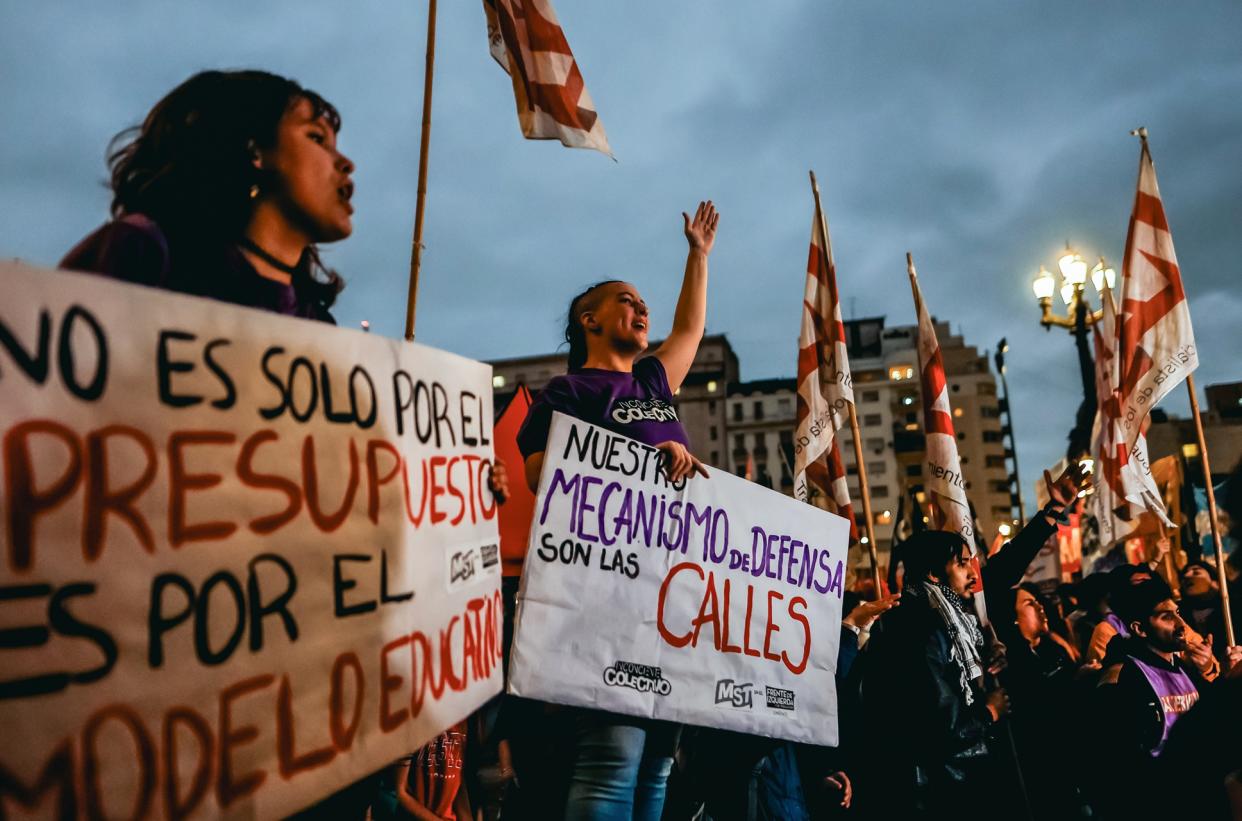International
Commissions of the Argentine Senate resume debate on key law for Javier Milei

The Law Bases and Starting Points for the Freedom of Argentines, the star project of the Executive of Javier Milei, faces a decisive week from this Monday in its discussion prior to its processing in the Senate.
A plenary meeting of the Senate General Legislation, Budget and Finance and Constitutional Affairs committees will resume this Monday at 3:00 p.m. local time (18.00 GMT) the debate of the law and the fiscal package that were approved by Deputies on April 30 and that the Executive needs to show governance and sustainability to its economic program.
At the same time, the ruling party’s negotiations continue with the other blocks of Senators and provincial governors to approve a law that the Executive had imposed as a deadline before May 25.
Times run against the ruling party because several opposition leaders question the level of the income tax on wages, the Incentives for Large Investments (RIGI) Regime and money laundering that are contained in the bills.
If the senators modify the bill, they must return to Deputies so that it is finally sanctioned.
The presidential spokesman, Manuel Adorni, defended the RIGI on Monday by indicating that “it is not the looting of the country,” “it does not help entrepreneurs to take money abroad,” “much less merge SMEs,” but will attract investments of more than 200 million dollars that “are not made if there is no tax and exchange rate stability” and “will give impetus to the economy, investments and employment,” and will allow “triple the level of exports in a decade.”
The senators of La Libertad Avanza, a far-right party led by Milei, are only seven, another 33 are opposition Peronists and the rest of the 72 legislators of the Upper House are composed of potential allies.
This is the second time that Parliament has debated the bill, since in February it was approved in general by the Chamber of Deputies, but later, in the face of a sure defeat in the vote article by article in the Lower House and a foreseeable subsequent rejection in the Senate, the ruling party chose to return the bill to commissions.
After successive negotiations, the Government submitted a new project with 232 articles (compared to the 664 of the original initiative), the first of which declares the public emergency in administrative, economic, financial and energy matters for a period of one year, giving the Executive delegated powers in those matters, much less than those initially claimed by Milei.
The initiative allows the reform of the State, enables the privatization of a dozen companies, involves controversial changes in labor and retirement legislation and includes incentives for the energy and hydrocarbons sector and for large investments.
Central America
Senator Van Hollen Meets with Deported MS-13 Member in El Salvador; Trump and Bukele React

U.S. Democratic Senator Chris Van Hollen, representing the state of Maryland, held a meeting in El Salvador with deported MS-13 gang member Kilmar Ábrego García, a member of the criminal group classified by the U.S. government as a terrorist organization.
“Kilmar Ábrego García, miraculously resurrected from the ‘extermination camps’ and ‘torture chambers,’ now sipping margaritas with Senator Van Hollen in the tropical paradise of El Salvador!” wrote President Nayib Bukeleon X (formerly Twitter), sharing photos of Van Hollen, Ábrego García, and a lawyer sitting together at a Salvadoran hotel.
The deported gang member is seen wearing a plaid shirt and a flat-brimmed cap, seated at a table with glasses and coffee cups. The senator also shared images of the meeting on his own social media accounts.
Bukele reaffirmed that Ábrego will remain in El Salvador and will not be returned to the United States.
“Now that his health has been confirmed, he has earned the honor of remaining under the custody of El Salvador,” Bukele added.
Former U.S. President Donald Trump criticized the senator’s meeting with Ábrego on Truth Social, calling Van Hollen “a fool” for advocating for Ábrego’s return to the U.S.
International
Pope Francis Appears for Easter Blessing, Calls for Peace and Religious Freedom

Pope Francis, still recovering from pneumonia, appeared on the balcony of St. Peter’s Basilica in the Vatican on Easter Sunday and, with a faint voice, wished a “Happy Easter” to the thousands of faithful gathered to celebrate the Resurrection of Christ.
A month after being discharged from a lengthy hospital stay, the presence of the 88-year-old pontiff had remained uncertain, with the Vatican not confirming his attendance ahead of time.
Eventually, the pope made a brief appearance in a wheelchair shortly after 12:00 p.m. (10:00 GMT) to deliver his traditional “Urbi et Orbi” blessing (“to the city and to the world”).
Although no longer wearing an oxygen cannula, the Argentine Jesuit relied on a close aide to read his Easter message, which touched on major global conflicts.
Francis condemned the “dramatic and unworthy humanitarian crisis” in Gaza and called for a ceasefire, while also expressing concern over the “growing climate of antisemitism spreading across the globe.”
He further emphasized the importance of religious freedom and freedom of thought, stating that without mutual respect, “peace is not possible.”
International
Thousands rally nationwide against Trump’s threat to U.S. democracy

Thousands of protesters gathered on Saturday (April 19, 2025) in major cities like New York and Washington, as well as in small communities across the United States, in a second wave of demonstrations against President Donald Trump. The crowds denounced what they view as growing threats to the country’s democratic ideals.
In New York City, demonstrators of all ages rallied in front of the Public Library near Trump Tower, holding signs accusing the president of undermining democratic institutions and judicial independence.
Many protesters also criticized Trump’s hardline immigration policies, including mass deportations and raids targeting undocumented migrants.
“Democracy is in grave danger,” said Kathy Valyi, 73, the daughter of Holocaust survivors. She told AFP that the stories her parents shared about Adolf Hitler’s rise to power in 1930s Germany “are happening here now.”
In Washington, demonstrators voiced concern over what they see as Trump’s disregard for long-standing constitutional norms, such as the right to due process.
-

 International4 days ago
International4 days agoArsenal stun Real Madrid at the Bernabéu to reach Champions League semifinals
-

 Central America3 days ago
Central America3 days agoNicaraguan Exiles to Mark 7th Anniversary of 2018 Protests with Global Commemorations
-

 International3 days ago
International3 days agoDominican ‘False Hero’ Arrested for Faking Role in Nightclub Collapse That Killed 231
-

 International4 days ago
International4 days agoBogotá residents line up for yellow fever vaccine amid national alert
-

 International2 days ago
International2 days agoACLU seeks emergency court order to stop venezuelan deportations under Wartime Law
-

 International4 days ago
International4 days agoDeSantis’ immigration crackdown sparks alarm in Venezuelan Communities in Doral
-

 Central America2 days ago
Central America2 days agoUN complaint filed against Costa Rica over detention of migrant children
-

 International4 days ago
International4 days agoMexico refuses to restore ties with Ecuador while Noboa remains in office
-

 International18 hours ago
International18 hours agoThousands rally nationwide against Trump’s threat to U.S. democracy
-

 Central America26 mins ago
Central America26 mins agoSenator Van Hollen Meets with Deported MS-13 Member in El Salvador; Trump and Bukele React
-

 International27 mins ago
International27 mins agoPope Francis Appears for Easter Blessing, Calls for Peace and Religious Freedom





























